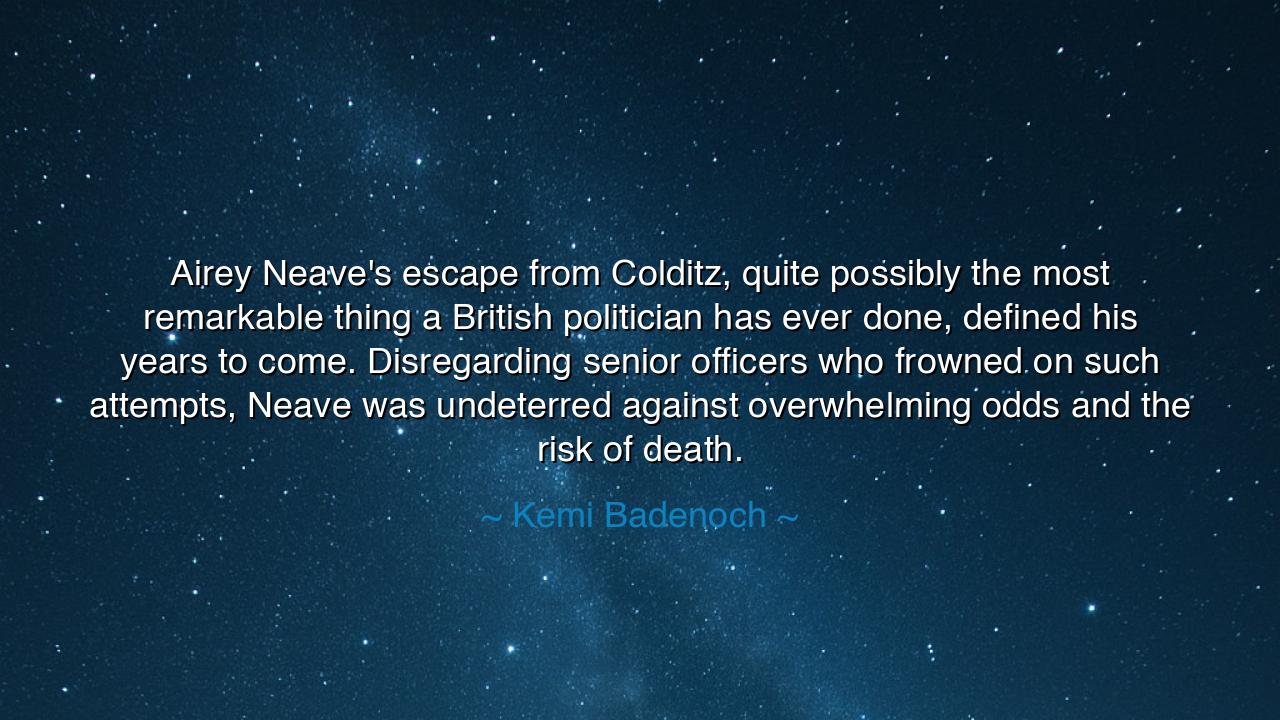
Airey Neave's escape from Colditz, quite possibly the most
Airey Neave's escape from Colditz, quite possibly the most remarkable thing a British politician has ever done, defined his years to come. Disregarding senior officers who frowned on such attempts, Neave was undeterred against overwhelming odds and the risk of death.






“Airey Neave’s escape from Colditz, quite possibly the most remarkable thing a British politician has ever done, defined his years to come. Disregarding senior officers who frowned on such attempts, Neave was undeterred against overwhelming odds and the risk of death.” Thus spoke Kemi Badenoch, paying tribute to a man whose courage was forged in the crucible of war and whose character became a beacon for generations to come. In these words lies more than the praise of a single hero; they carry the echo of a timeless truth—that the measure of a life is found not in comfort, but in defiance of fear. Airey Neave, through his daring escape from Colditz Castle, did more than flee captivity; he demonstrated that the indomitable will of the human spirit cannot be confined by walls of stone or the chains of tyranny.
The origin of this tale reaches back into the dark years of the Second World War. Colditz, perched on a German hill, was a fortress-prison reserved for those Allied officers deemed too dangerous, too clever, or too rebellious to remain elsewhere. Its walls were said to be impenetrable; its guards, relentless. Yet within those stone confines, hope and ingenuity thrived. Airey Neave, captured early in the war, refused to accept the finality of imprisonment. He studied the routines of the guards, the architecture of the castle, and the rhythm of the days until opportunity and courage aligned. In 1942, he and a companion made their daring bid for freedom, disguised as German officers, slipping through the very heart of the enemy’s stronghold. Against all odds, they succeeded—making Neave the first British officer to escape from Colditz and return home to fight again.
Badenoch’s words remind us that this act of bravery was not merely a physical escape; it was a triumph of resolve over despair. Many men—senior officers among them—warned against such reckless attempts, fearing that failure would lead to death or retribution for others. But Neave’s soul could not be stilled by prudence. His defiance was not born of vanity, but of duty—a belief that one must never surrender one’s spirit, even in captivity. In this, he joined the ranks of the truly heroic, those who understood that freedom is not given; it is seized through will and sacrifice. Like the Spartans at Thermopylae or the Polish partisans in occupied Europe, Neave chose the perilous road, not for glory, but for honor.
And indeed, as Badenoch declared, the escape defined his years to come. For when peace finally returned to Europe, Neave did not rest upon his laurels. The fire that had burned within him in Colditz became the guiding light of his public life. He entered politics, carrying with him the same clarity of purpose and unbending courage that had led him to freedom. In his later years, he became a mentor and ally to Margaret Thatcher, shaping the course of British leadership. Yet the very fearlessness that made him great would also mark his end—for in 1979, he was assassinated by extremists, struck down by those who despised the very ideals he had lived to defend. His story thus forms a perfect circle: a man who escaped death in war, only to meet it in the service of peace.
To the ancients, Neave’s story would have been sung in the language of virtue. The Greeks would have called his courage arete—excellence of the soul, the harmony of action and purpose. The Romans would have named him a man of fortitudo and honestas—strength and honor. For he embodied the timeless lesson that true freedom lies not in circumstance, but in the mastery of one’s own will. Even in chains, a man may be free if his spirit is unbroken; even in liberty, one is enslaved if ruled by fear. Airey Neave proved that heroism is not the absence of danger, but the triumph of conviction over it.
History is full of such figures who dared to defy the impossible. Nelson Mandela, imprisoned for twenty-seven years, emerged not broken, but unyielding, to lead his nation toward reconciliation. Like Neave, he understood that captivity can forge character, that suffering can refine the soul. The same flame that burned in the hearts of the ancient heroes, that drove Neave through the shadows of Colditz, burned too in Mandela’s heart—a reminder that courage knows no nation, no century, no limit. The prisons change, the walls differ, but the human will to be free remains eternal.
So, my friends, let the story of Airey Neave be more than a tale of wartime valor—let it be a mirror to our own age. For though few of us will ever face prison walls or peril of death, each of us must one day confront fear, doubt, and the temptation to surrender. Remember Neave’s lesson: when others counsel caution, when the path ahead seems impossible, let your heart be steadfast. Disregard the voices that shrink from risk, for greatness is never born from safety. Build within yourself the same fortitude—to fight for what is right, to strive for what is noble, and to remain unbroken, even when the world would see you contained.
In the end, as Kemi Badenoch reminds us, the meaning of Airey Neave’s escape is not only in what he escaped from, but in what he escaped toward—a life of service, of courage, of principle. His example endures as a torch for all who walk through dark times. And so we, too, must live by that immortal creed: that though the walls around us may be high, the spirit that dares to climb them stands forever free.






AAdministratorAdministrator
Welcome, honored guests. Please leave a comment, we will respond soon